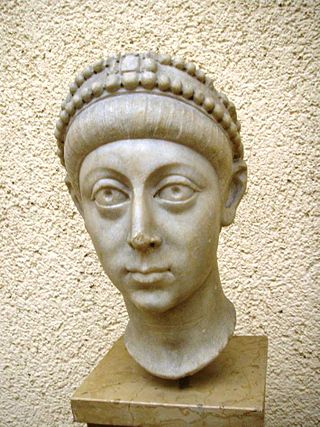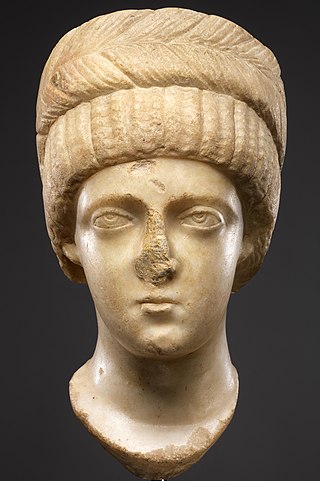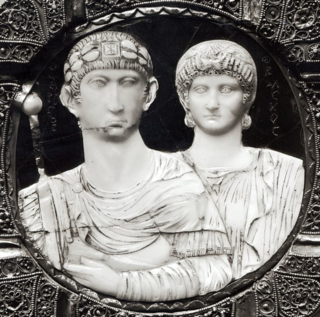Related Research Articles

Arcadius was Roman emperor from 383 to his death in 408. He was the eldest son of the Augustus Theodosius I and his first wife Aelia Flaccilla, and the brother of Honorius. Arcadius ruled the eastern half of the empire from 395, when their father died, while Honorius ruled the west. A weak ruler, his reign was dominated by a series of powerful ministers and by his wife, Aelia Eudoxia.

Honorius was Roman emperor from 393 to 423. He was the younger son of emperor Theodosius I and his first wife Aelia Flaccilla. After the death of Theodosius in 395, Honorius, under the regency of Stilicho, ruled the western half of the empire while his brother Arcadius ruled the eastern half. His reign over the Western Roman Empire was notably precarious and chaotic. In 410, Rome was sacked for the first time in almost 800 years.

Year 398 (CCCXCVIII) was a common year starting on Friday of the Julian calendar, the 395th Year of the Common Era (CE) and Anno Domini (AD) designations, the 398th year of the 1st millennium, the last 3 years of the 4th century, and the 9th and pre-final year of the 390s decade. At the time, it was known as the Year of the Consulship of Augustus and Eutychianus. The denomination 398 for this year has been used since the early medieval period, when the Anno Domini calendar era became the prevalent method in Europe for naming years.
The 390s decade ran from January 1, 390 to December 31, 399

Stilicho was a military commander in the Roman army who, for a time, became the most powerful man in the Western Roman Empire. He was of Vandal origins and married to Serena, the niece of emperor Theodosius I. He became guardian for the underage Honorius. After nine years of struggle against barbarian and Roman enemies, political and military disasters finally allowed his enemies in the court of Honorius to remove him from power. His fall culminated in his arrest and execution in 408.

Constans II was the son of Western Roman emperor Constantine III, and served as his co-emperor from 409 to 411. Constans was a monk prior to his father being acclaimed emperor by the army in Britain in early 407, an act of rebellion against the ruling emperor Honorius. He was summoned to Gaul, appointed to the position of caesar (heir) and swiftly married so that a dynasty could be founded. In Hispania, Honorius's relatives rose in 408 and expelled Constantine's administration. An army under the generals Constans and Gerontius was sent to deal with this and Constantine's authority was re-established. Honorius acknowledged Constantine as co-emperor in early 409 and Constantine immediately raised Constans to the position of augustus (emperor), theoretically equal in rank to Honorius as well as to Constantine. Later in 409 Gerontius rebelled, proclaimed his client Maximus emperor and incited barbarian groups in Gaul to rise up. Constans was sent to quash the revolt, but was defeated and withdrew to Arles. In 410, Constans was sent to Hispania again. Gerontius had strengthened his army with barbarians and defeated Constans; the latter withdrew north and was defeated again and killed at Vienne early in 411. Gerontius then besieged Constantine in Arles and killed him.
Eutropius was a fourth-century Eastern Roman official who rose to prominence during the reign of emperor Arcadius. He was the first eunuch to become a consul in the Roman Empire.

Serena was a Roman noblewoman of the Theodosian dynasty, niece of emperor Theodosius I and wife of the military commander Stilicho.

Aelia Flavia Flaccilla was a Roman empress and first wife of the Roman Emperor Theodosius I. She was of Hispanian Roman descent. During her marriage to Theodosius, she gave birth to two sons – future Emperors Arcadius and Honorius – and a daughter, Aelia Pulcheria.
The Battle of Pollentia was fought on 6 April 402 (Easter) between the Romans under Stilicho and the Visigoths under Alaric I, during the first Gothic invasion of Italy (401–403). The Romans were victorious, and forced Alaric to retreat, though he rallied to fight again in the next year in the Battle of Verona, where he was again defeated. After this, Alaric retreated from Italy, leaving the province in peace until his second invasion in 409, after Stilicho's death.
The Gildonic War was a rebellion in the year 398 led by Comes Gildo against Roman emperor Honorius. The revolt was subdued by Stilicho, the magister militum of the Western Roman empire.
Firmus was a Berber Numidian prince and Roman usurper under Valentinian I.
Galla was a Roman empress as the second wife of Theodosius I. She was the daughter of Valentinian I and his second wife Justina.

Maria was a Roman empress as the first wife of the Western Roman Emperor Honorius. She was the daughter of the general Stilicho. It is uncertain when she was born, but she must have been no older than fourteen at the time of her marriage. Maria had no children, and died in 407. After her death, Honorius married her sister Thermantia.

Aemilia Materna Thermantia was a Roman empress as the second wife of the Western Roman Emperor Honorius.

Roman Tunisia initially included the early ancient Roman province of Africa, later renamed Africa Vetus. As the Roman empire expanded, the present Tunisia also included part of the province of Africa Nova.

Mauri was the Latin designation for the Berber population of Mauretania, located in the west side of North Africa on the shores of the Mediterranean Sea, Mauretania Tingitana and Mauretania Caesariensis, in present-day Morocco and northwestern Algeria.
Flavius Timasius was a general of the Roman Empire, a relative of the Empress Aelia Flaccilla, wife of Emperor Theodosius I.
Mascezel was briefly ruler of Roman North Africa after the defeat of his brother Gildo during the Gildonic war in 398 AD.

Eucherius was the son of Stilicho, the magister militum of the Western Roman Empire, and Serena, a Roman noblewoman who was the niece of Eastern Roman Emperor Theodosius I. He was born in c. 388 in Rome, Italy. Despite being the son of the magister militum, Eucherius did not rise farther than the modest rank of tribune of the notaries. Stilicho was accused by his political opponents of plotting to install Eucherius as a third emperor in Illyricum, and as a result of this Stilicho was arrested and executed on 22 August 408, and Eucherius soon after.
References
- Platts, John, s.v. "Gildo", A New Universal Biography, Sherwood, Jones, and Co., 1826